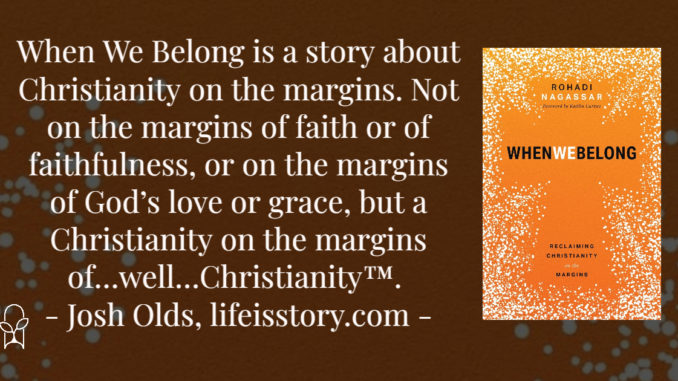
Published by Herald Press on June 14, 2022
Genres: Non-Fiction, Christian Life
Buy on Amazon
Goodreads

Step into a journey toward liberation, belonging, and a faith that makes you whole again.
We need belonging to survive and thrive, but too often the church is an impediment. For Christians who know the pain, isolation, and loss of identity that comes with the ongoing struggle to be seen in churches and institutions full of barriers to belonging, you are not alone. Sometimes it can feel easier to walk away from faith completely. But there is another way. When it feels as though there’s no place left to belong, Jesus invites us into a love that knows no bounds and a community that truly liberates.
In this hope-filled book, author Rohadi Nagassar brings the margins to the center to help readers rediscover a reality of love, belonging, and beauty through the journey of deconstructing, decolonizing, and reclaiming faith. For those on the margins struggling to find belonging, for everyone who wants to join in building radically inclusive communities where all people can live fully in their own skin—now begins a journey to find this freedom.
When We Belong is a story about Christianity on the margins. Not on the margins of faith or of faithfulness, or on the margins of God’s love or grace, but a Christianity on the margins of…well…Christianity™. You know, the culturally empowered Western Christianity that is overwhelmingly White, middle-class, and conservative. Before When We Belong, I would have called it American Evangelicalism, but author Rohadi Nagassar writes from a Canadian perspective, so maybe it’s more like a White Evangelicalism. In any case, Nagassar’s goal is to focus on the faithfulness of this culturally marginalized group in all its forms and show that being on the margins of “organized religion” just may place one closer within the will of God.
Nagassar writes from a personal and practical perspective. He’s a church planter with a non-traditional church. He leads a diverse church congregation that meets once a month for group church service, but one meets together and lives and works together continually throughout life. Nagassar is also Asian and Indian-American, living in a predominantly White area (on land historically belonging to Canadian Indigenous peoples).
One of the highlights of When We Belong for me was his discussion about making a home on the margins rather than seeking a belonging that looks more like assimilation. In the chapter “The Problems of Belonging,” Nagassar says that belonging can happen in five different ways: assimilation, join an ethic church, build diversity, leave, or—his preference—create something new. I am White, but served in an ethnically Chinese church for many years. Through that experience, I saw the need for ethnic churches and how most churches that said they wanted to be multi-cultural really just wanted some browner faces in the congregation (not in places of power). Nagassar highlights the problem of assimilation—the fact that everyone is expected to conform to White cultural expressions of faith. But then he also points out the problems with ethnically segregated churches. For Nagassar, it’s not even enough to build diversity. Instead, When We Belong invites us to rethink what church means for us.
Nagassar envisions belonging as something happening in a church environment that is built out of community and shared togetherness. There is little positional hierarchy and it’s the gathering together as humans to engage as a group in social and creative acts that serve as the community’s core. When We Belong offers a radical new way of thinking about church—something increasingly necessary as we look at where the “traditional” church has gotten us.
